 Taigan is originated from Kyrgyzstan but Yochon is originated from United States. Taigan may grow 54 cm / 22 inches higher than Yochon. Taigan may weigh 25 kg / 56 pounds more than Yochon. Both Taigan and Yochon has almost same life span. Both Taigan and Yochon has same litter size. Taigan requires Low Maintenance. But Yochon requires Moderate Maintenance
Taigan is originated from Kyrgyzstan but Yochon is originated from United States. Taigan may grow 54 cm / 22 inches higher than Yochon. Taigan may weigh 25 kg / 56 pounds more than Yochon. Both Taigan and Yochon has almost same life span. Both Taigan and Yochon has same litter size. Taigan requires Low Maintenance. But Yochon requires Moderate Maintenance
Basic Information
undefined
Kyrgyzstan
United States
Life Span:
11 - 13 Years
10 - 14 Years
Other Names:
Kyrgyzdyn Taighany
Bichyorkie • Borkie • Yo-Chon • Yochon • Yorki-Chon • Yorkichon • Yorkiechon • Yorkie-Chon • Yorkie-Bichon • Yorkshire Frise
Colors Available:
grey or yellow - bi-colored, Cream, black and white, brown
Black, Blonde, Brown, Cream, Dark, Brown, Golden, Gray, White
Coat:
Medium length, wavy or curly
silky or curly very full coat
Temperament:
Affectionate, Alert, Cheerful, Courageous, Curious, Docile, Energetic, Friendly, Gentle, Independent, Intelligent, Lively, Loving, Loyal, Outgoing, Playful, Protective, Quiet, Responsive, Social, Stubborn, Territorial
Alert, Energetic, Friendly, Independent, Intelligent, Loving, Playful
Grooming:
Low Maintenance
Moderate Maintenance
Trainability:
Easy
Moderate
New Owners Friendly:
Yes
Yes
History
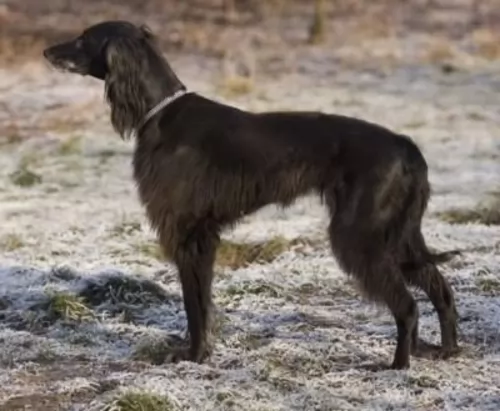 Known also as the Kyrgyzdyn Taighany, the Taigan is a sighthound dog from Kyrgyzstan. Today the dog is recognized by a number of kennel clubs,and more recently by the FCI.
Known also as the Kyrgyzdyn Taighany, the Taigan is a sighthound dog from Kyrgyzstan. Today the dog is recognized by a number of kennel clubs,and more recently by the FCI.
It was after 1991, when Kyrgyzstan became independent, that the role of the dog changed and t became a working dog again.
It was about in 1995 that a new breed standard was adopted, and since 2005 a national kennel club has existed in Kyrgyzstan.
The Yochon is a “designer dog” – a cross between the Yorkshire Terrier and the Bichon Frise. They are not a purebred and are not recognized by purebred dog clubs such as the American Kennel Club (AKC). They are small, playful, families dogs. Most of them bear the best characteristics of each of their founding breeds, but because they are crossbreeds and most will be multi-generational cross breeds, there are no two dogs alike.
Though not recognized by the traditional purebred clubs they are recognized by several hybrid canine clubs. The cross was developed in the United States.
Description
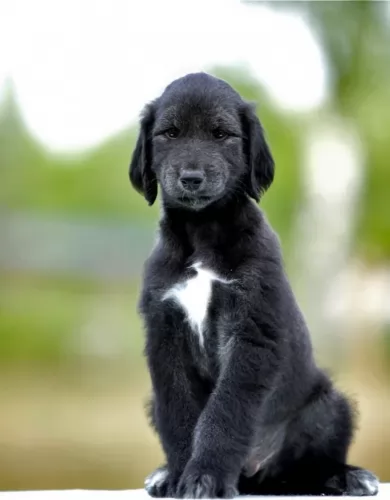 The Taigan is a large dog, looking much like a Grehound. He stands at between 55 and 82cm in height and weighs about 25 - 34kg.
The Taigan is a large dog, looking much like a Grehound. He stands at between 55 and 82cm in height and weighs about 25 - 34kg.
He has that typical slender body and slender head of the greyhound. The coat of the dog is medium length and somewhat curly and can be many colours, sometimes even bi-colored – cream, black and white, brown, grey or yellow.
During the Winter the coat can become long and thick. The ears are floppy and covered with wavy fur. The tail is long and a distinguishing mark of the dog is the way the end of the tail coils up into a ring.
These dogs can’t be kept in small city properties – they are used to wide open spaces.
Temperament:
An intelligent breed, the Taigan will readily learn some basic commands to make him well mannered and obedient. He is strong willed and independent, so it will be beneficial to have him trained.
He also makes a good watchdog. He is an even-tempered dog and he enjoys human companionship although he is somewhat reserved with strangers. Even so, he will still need a strong, firm owner as he is strong-willed and independent and likes to go his own way.
He is able to get along well with children in the home and other pets. Being a fairly large dog, and one that likes to run, he is better suited to large properties in the countryside as opposed to living in the city.
Yochons go by many different names but in general they are toy dogs, weighing in at under 20 pounds, most weighing 6-12 pounds. They have black noses, long tails, and round eyes. Their muzzles are blunt and their skulls are also round.
They have fluffy, full coats that can range from tan, to brown to black. They can also be white or cream. Their ears can be either hanging or erect.
Characteristics
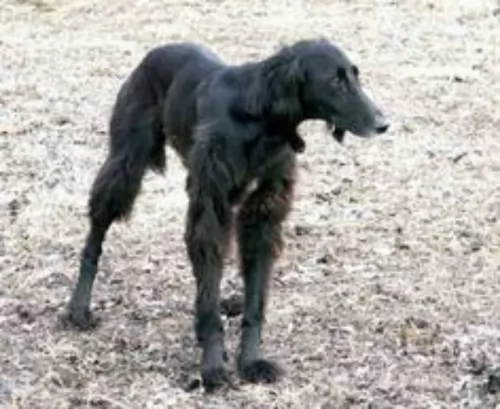 Taigans are energetic dogs and they want a lot of activity. They’re good watchdogs too and are gentle with children.
Taigans are energetic dogs and they want a lot of activity. They’re good watchdogs too and are gentle with children.
They’re intelligent and independent and also strong willed. They’re fearless, calm, balanced, loving and loyal and capable of being an excellent pet and companion.
1 Children friendliness -yes very good but watch careful that children do not hurt them as they are so small and fragile.
2.Special talents – Loves families and playing
3.Adaptability – adapts well to apartments can play indoors
4.Learning ability – intelligent and independent
Health Problems
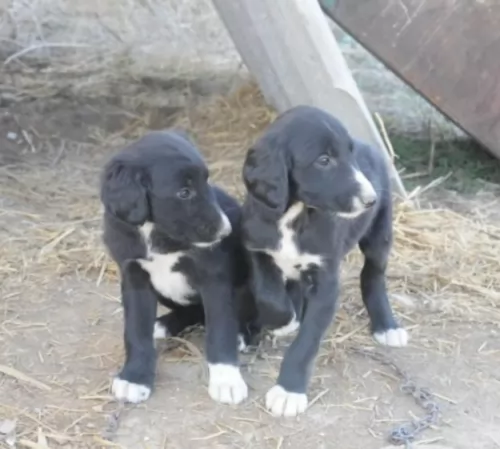 Any dog, no matter how healthy they may appear to be, can encounter any one of the many common dog illnesses there are. It is highly unlikely that your Taigan will experience these health issues but it’s good to be aware of some of them -
Any dog, no matter how healthy they may appear to be, can encounter any one of the many common dog illnesses there are. It is highly unlikely that your Taigan will experience these health issues but it’s good to be aware of some of them -
Bone Cancer:
Also known as osteosarcoma, bone cancer is more commonly seen in large dogs of any breed. It’s a cancer which spreads rapidly through the body and it is terribly sad that the prognosis for your dog is poor.
You might notice swelling, joint pain and lameness and your dog will appear to always be tired. Sometimes you might see a growth. Your vet might do x-rays and if you catch it early, you can give your pet a longer lease on life.
Both founding breeds are vulnerable to a few medical conditions. These include:
• Legg-Calve-Perthes Disease – insufficient blood to hind legs, thigh bones causing lameness.
• Patellar Luxation – slipped kneecaps can also cause lameness.
• Dental Issues – keep teeth brushed and cleaned.
• Hypothyroidism – can be treated with medication.
• Reverse Sneezing
• Allergies
• Collapsed Trachea due to small size – be careful with them at all times.
Caring The Pet
The Taigan is a large slender dog and you want to keep him that way.
Diet:
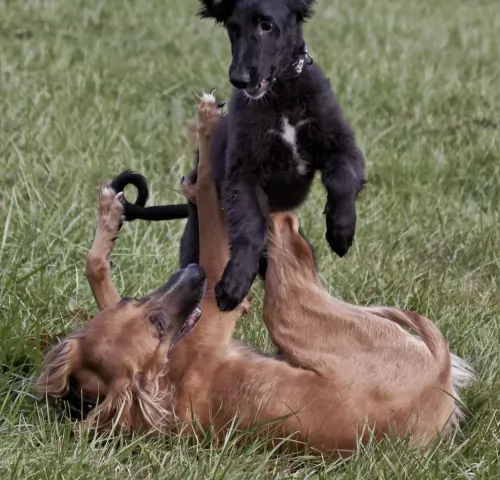 If you feed him one of the commercially manufactured dog foods, make sure its for a large, active dog breed and that it has a good list of ingredients. There are bad packaged dog foods and you want to avoid these. They are devoid of vitamins and minerals.
If you feed him one of the commercially manufactured dog foods, make sure its for a large, active dog breed and that it has a good list of ingredients. There are bad packaged dog foods and you want to avoid these. They are devoid of vitamins and minerals.
Read the packaging to see how much food to give. Also try and give your dog some home-made food too. Make sure it isn’t spicy, exotic foods. Stick to simple, wholesome foods such as boiled chicken, brown rice or pasta, sweet potatoes, spinach and carrots. Chop the food up and mix it into the dry kibble twice a week or so as a treat.
Also try and include some raw meat in occasionally.
Never leave your pet without a constant supply of fresh, cool water.
General Care:
Provide your pet with a dry, peaceful place to sleep.
Get him to the vet if he is showing signs of sickness.
Give him a good dose of exercise – walks, hikes, runs, ball games etc.
See that his vaccines are up to date.
Have him or her neutered or spayed to avoid unwanted puppies.
If you bring a dog into your family, provide it with love and attention.
3.Feeding the puppy – do not overfeed. Use a high quality puppy toy breed kibble. Feed 3-4 X day.
2.Feeding the adult – do not overfeed. Use a high quality adult toy breed kibble. Feed at least twice a day.
3.Points for Good Health hearty/general good health and stamina
4. Games and Exercises does not need a lot of exercise . They enjoy obedience and agility trials.
Comparison with other breeds
- Yochon vs English Bulldog - Breed Comparison
- Yochon vs German Shepherd - Breed Comparison
- Yochon vs Golden Retriever - Breed Comparison
- Yochon vs Labrador Retriever - Breed Comparison
- Yochon vs West Highland White Terrier - Breed Comparison
- Yochon vs French Bulldog - Breed Comparison
- Yochon vs Beagle - Breed Comparison
- Yochon vs Yorkshire Terrier - Breed Comparison
- Yochon vs Poodle - Breed Comparison
- Yochon vs Rottweiler - Breed Comparison
- Yochon vs Boxer - Breed Comparison
- Yochon vs English Pointer - Breed Comparison
- Yochon vs Siberian Husky - Breed Comparison
- Yochon vs Doberman Pinscher - Breed Comparison
- Yochon vs American Bully - Breed Comparison
- Yochon vs Abruzzenhund - Breed Comparison
- Yochon vs Affenpinscher - Breed Comparison
- Yochon vs Afghan Hound - Breed Comparison
- Yochon vs Aidi - Breed Comparison
- Yochon vs Airedale Terrier - Breed Comparison
- Yochon vs Akbash Dog - Breed Comparison
- Yochon vs Akita - Breed Comparison
- Yochon vs Africanis - Breed Comparison
- Yochon vs Askal - Breed Comparison
- Yochon vs Atlas Terrier - Breed Comparison
- Taigan vs English Bulldog - Breed Comparison
- Taigan vs German Shepherd - Breed Comparison
- Taigan vs Golden Retriever - Breed Comparison
- Taigan vs Labrador Retriever - Breed Comparison
- Taigan vs West Highland White Terrier - Breed Comparison
- Taigan vs French Bulldog - Breed Comparison
- Taigan vs Beagle - Breed Comparison
- Taigan vs Yorkshire Terrier - Breed Comparison
- Taigan vs Poodle - Breed Comparison
- Taigan vs Rottweiler - Breed Comparison
- Taigan vs Boxer - Breed Comparison
- Taigan vs English Pointer - Breed Comparison
- Taigan vs Siberian Husky - Breed Comparison
- Taigan vs Doberman Pinscher - Breed Comparison
- Taigan vs American Bully - Breed Comparison
- Taigan vs Abruzzenhund - Breed Comparison
- Taigan vs Affenpinscher - Breed Comparison
- Taigan vs Afghan Hound - Breed Comparison
- Taigan vs Aidi - Breed Comparison
- Taigan vs Airedale Terrier - Breed Comparison
- Taigan vs Akbash Dog - Breed Comparison
- Taigan vs Akita - Breed Comparison
- Taigan vs Africanis - Breed Comparison
- Taigan vs Askal - Breed Comparison
- Taigan vs Atlas Terrier - Breed Comparison
 Petzlover
Petzlover Taigan is originated from Kyrgyzstan but Yochon is originated from United States. Taigan may grow 54 cm / 22 inches higher than Yochon. Taigan may weigh 25 kg / 56 pounds more than Yochon. Both Taigan and Yochon has almost same life span. Both Taigan and Yochon has same litter size. Taigan requires Low Maintenance. But Yochon requires Moderate Maintenance
Taigan is originated from Kyrgyzstan but Yochon is originated from United States. Taigan may grow 54 cm / 22 inches higher than Yochon. Taigan may weigh 25 kg / 56 pounds more than Yochon. Both Taigan and Yochon has almost same life span. Both Taigan and Yochon has same litter size. Taigan requires Low Maintenance. But Yochon requires Moderate Maintenance Known also as the Kyrgyzdyn Taighany, the Taigan is a sighthound dog from Kyrgyzstan. Today the dog is recognized by a number of kennel clubs,and more recently by the FCI.
Known also as the Kyrgyzdyn Taighany, the Taigan is a sighthound dog from Kyrgyzstan. Today the dog is recognized by a number of kennel clubs,and more recently by the FCI. The Taigan is a large dog, looking much like a Grehound. He stands at between 55 and 82cm in height and weighs about 25 - 34kg.
The Taigan is a large dog, looking much like a Grehound. He stands at between 55 and 82cm in height and weighs about 25 - 34kg. Any dog, no matter how healthy they may appear to be, can encounter any one of the many common dog illnesses there are. It is highly unlikely that your Taigan will experience these health issues but it’s good to be aware of some of them -
Any dog, no matter how healthy they may appear to be, can encounter any one of the many common dog illnesses there are. It is highly unlikely that your Taigan will experience these health issues but it’s good to be aware of some of them - If you feed him one of the commercially manufactured dog foods, make sure its for a large, active dog breed and that it has a good list of ingredients. There are bad packaged dog foods and you want to avoid these. They are devoid of vitamins and minerals.
If you feed him one of the commercially manufactured dog foods, make sure its for a large, active dog breed and that it has a good list of ingredients. There are bad packaged dog foods and you want to avoid these. They are devoid of vitamins and minerals.